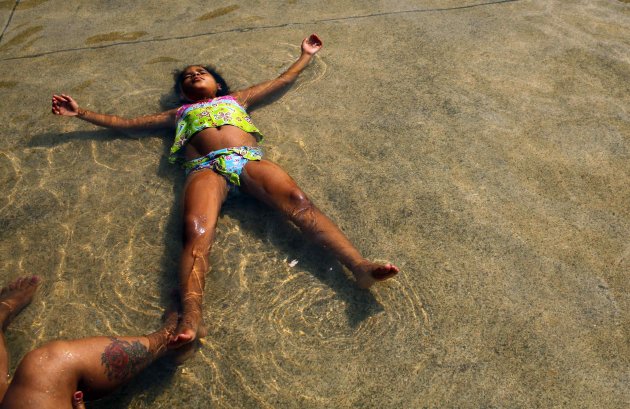
MINNEAPOLIS (AP) — In the land of giant ice castles, where auto makers test their vehicles against extreme cold and people play hockey year-round, it's not uncommon to hear some griping about the weather.
The Upper Midwest is accustomed to extreme temperatures. Just not in the current direction.
Parts of the region are suffering through the worst heat wave in more than a decade, leaving residents who usually eagerly await a too-short summer longing for a taste of December. The heat index topped 119 degrees Tuesday in Minneapolis. And it felt like 105 degrees in Madison, Wis.
Even at the Minnesota Zoo, known for displaying northern-latitude animals, workers say the heat can make some animals — like people — "really crabby." But they're keeping thick-furred tigers happy with "bloodsicles."
"It's kind of gross, but they like it," said Diana Weinhardt, who supervises the Northern Trails exhibit. She spent 15 years at the zoo in Houston, and admitted the heat was even rough on her.
"This is very, very Texas-esque weather and it's hard, especially if you're not used to it. In Texas we all kind of grew hardened to it, but here — ugh."
In Minneapolis, some employees of The Olsen Fish Company — which bills itself as the world's largest producer of the Scandinavian delicacy lutefisk — have refused to go outside on break. Instead, they're hanging out in the 44-degree room where pickled herring is processed, company president Chris Dorff said.
When they do venture outside, they get plenty of space on the commuter train home because "when you work in a herring and lutefisk facility, you have this, this odor," Dorff said.
Lutefisk is dried cod soaked in lye, rinsed and boiled, and mix those scents with a little sun and sweat, and "we all leave a little more odiferous, that's for sure," he said.
Generations of Bachman's Floral Gifts and Gardens employees have worked to protect the company's plants from the winter, but this week they're trying to keep the Christmas crop of poinsettias from baking. Their greenhouses south of Minneapolis run 10 to 15 degrees warmer than the outside air, and the heat has threatened to wilt both workers and the young plants trying to grow roots.
"They are just trying to survive, I guess, like we are," said Jack Geyan, Bachman's production manager who admits the heat is making him nostalgic for winter. "Some guys in the nursery asked me if I would rather have 30 below or this temperature. And I said, 'well, 30 below is a little cold, but maybe 20 below.'"
University of Minnesota meteorologist Mark Seeley said the number of days with temperatures in the high 90s or 100s hasn't really increased, but the amount of days with soaring humidity have.
"We have had far more dew point-driven heat waves in recent decades than any time in the past," he said.
It's been at least 12 years since Minnesota has seen such heat indexes, day after day, like those this week.
The brutal heat in Wisconsin forced Josh Martinez, operations manager of All-State Roofing in Madison, to pull in his crews this week. "It's a whole lot better and safer for us just to not do a job," he said. "We figure it's better to be safe than sorry."
In Minnesota, where hockey players venture to indoor rinks when the lakes thaw, one indoor rink struggling to keep its ice intact fired up cooling equipment for the first time in a decade — and is expecting a $10,000 spike in this month's utility bill.
"There's equipment that we haven't run in 10 years, we actually turned it on, just so we could stay ahead of the heat," said Andy Baltgalvis, manager of the Bloomington Ice Garden south of Minneapolis.
It hasn't just been people struggling in the heat.
The Minnesota Zoo, in a suburb south of Minneapolis, prides itself on displaying caribou, musk oxen, moose and other northern animals who have been kept cool this week with extra water and fans.
Zookeepers do what they can for animals with thick fur. The Amur tigers from north Asia at being treated to the frozen runoff from meat fed to the zoo's carnivores. Weinhardt said it's a hot-weather tool that seems to work.
"Just like us, some animals can get really crabby in hot weather," Weinhardt said.


